Controversial finish as South Africa defeat Ireland after the siren
- Tuesday, September 09 2008 @ 10:20 am ACST
- Contributed by: Ash Nugent
- Views: 10,539

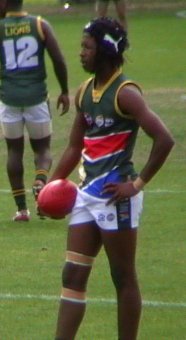
The match to decide third and fourth place was always going to be interesting. Ireland were the inaugural International Cup winners. In their heyday they looked unbeatable with a steady league, players with experience in a similar sport (Gaelic football) and arguably more familiarity with Australian football than their rivals. Their opponents, South Africa had finished last in 2002, fielding a team very new to football, and consequently suffered losses of 162, 27, 77 and 128 points.
Six years later things were a little different. The Irish were expected to take a slide down the ladder. Their league at best has been treading water and was only starting to again find its feet. The Warriors had only managed fourth place at the 2005 tournament, and in the years between had lost their first ever match to long-time rivals Great Britain. On the other hand AFL South Africa now boasted 14,000 registered players, they had won two games at the 2005 tournament (including their first-ever victory) and for the past few years had played several matches against Australian youth sides, providing invaluable experience.
Both countries had been impressive so far at the 2008 tournament. Ireland comprehensively beat Sweden and Finland, and overcame a much-improved Canada. Whilst they went down to New Zealand and missed another shot at the Grand Final, they were by no means disgraced. South Africa too won all their pool matches, and beat the USA for the first time, but were outclassed by PNG in their Semi Final.
In the end it took a 25 metre penalty and a kick after the siren, but South Africa won the match by the slimmest of margins, a solitary point.
The match was played on Ransford Oval, starting at midday. A small crowd was present to see the second most important match of the day. Players took their positions ready for the opening bounce. Both teams were in stark contrast to each other. Almost every Irish player stood taller than his opponent, in some cases quite considerably. The Irish players were very vocal and more in the mould of your "typical" Australian footballer. The South Africans were a more raw talent. Ethnically, they are predominantly black or coloured, but with white players holding down the key positions of full-forward and full-back.
The match began and the South Africans were the first on the board with a minor score. But it didn't take long for the ball to end up in the Irish forward line, with the Warriors taking initial control of the match and kicking the first goal. Prinsloo for South Africa took a solid mark in defence, preventing another Irish goal, but the Warriors managed one more for the quarter. The Irish were up by eleven points at the first change, having kept the Lions goalless.
The Irish got the first and only goal of the second, through a solid mark to Liam O'Connor. The Africans did show glimpses of talent, Khaya Sikiti scooping the ball off the ground in a fluid motion, but too often they bombed the ball forward where Ireland's talls picked off easy marks. The Irish led by sixteen at the main break, though the Africans were full of run and still very much in the game.
The South Africans finally got their first major in the third. Samuel Sethibi had a chance to goal but missed, before Tshepiso Mogapi marked an Irish kick-in and kicked truly. The Lions had lifted and found the ball repeatedly in their forward line, but player of the tournament Mike Finn stood tall, stalling the South Africans' attack. Going into the last quarter, the Irish lead had been narrowed to seven points in a five goal quarter.
The final quarter was intense. South Africa kicked several points and cut their opponents' lead back to five points. The Irish managed a shot on goal (which they celebrated) but it was deemed touched on the line. Wayward kicking from the South Africans brought the lead back to five, but had their inaccuracy cost them the match?
As the siren approached the ball was in South Africa's half. Then drama began to unfold. A kick across the field to centre-half-back saw the Lions awarded a free kick. Simphiwe Mbhalo was dead in front but the man on the mark was on the edge of the centre square, so the kick would be from about 60m - given the distances being kicked by most of the players, the chances that the lightly built player could make the distance was effectively zero. The high drama intensified as the siren sounded - South Africa still 5 points behind. What followed depends on who you ask. We'll start with how it appeared to most of the gathering spectators. Mbhalo came in for his almost certainly futile kick, then dodged the man on the mark. The crowd groaned, assuming he didn't know the rule that since the siren had gone, any play on would immediately end the game and his kick not count.
Then the controversy erupted. The Irish began to celebrate but then people realised the umpire was paying a 25m penalty. Some wondered if he was simply giving the player another chance. Sections of the crowd began to boo, and from around 35m out the youngster slotted the biggest kick of his life, just squeezing it inside the goalpost - South Africa by 1 point. The Lions burst into celebration, supporters and staff running onto the field with flags, while for the Irish it was a mixture of devastation and anger. What exactly had happened?
AFL International Co-ordinator Josh Vanderloo immediately approached the umpire to have him explain his decision. The umpire claimed the man on the mark was in fact past the mark and had been told to come back several times, and even went forward of the mark as Mbhalo had come in, startling the kicker, hence he ran around. Certainly that all makes sense, and if the umpire was paying 25m then the correct decision is indeed to re-set the mark and allow the player to kick again. Shades of former Melbourne player, Irishman Jim Stynes running between the man on the mark and the man with ball in the 1987 preliminary final, costing his side a penalty and probably a spot in the grand final.
The Irish on the other hand were quite sure that their player was on the mark and there had been no reason for the 25m penalty, and it came at the end of a game in which they felt they were on the wrong end of many decisions. It was a terrible way to lose, and there's no doubt that in international circles the South Africans are seen as the AFL's golden child.
From the standing of the two worldfootynews.com writers present, neither were in a position to tell whether the Irish player was over the mark. We went looking for other opinions, and found many. Several members of the crowd claimed it was in response to an off-the-field incident, and was irrelevant as the game had been called. Another member of the crowd felt it had been obvious the player was over the mark, and in fact thought that if the second kick had missed, there would've been a third kick because the player had again gone over the mark. Yet another opinion, from an official with a third country, agreed the man was over the mark, though he thought the umpire had not made it sufficiently clear and was symptomatic of using at times unsuitable umpires in such high pressure games where people are representing their country.
worldfootynews.com writer Brett Northey interviewed two of the Irish staff after the match, and they were clearly unhappy with how things unfolded. Ireland Team Manager Ciarán Ó hEadhra said "South Africa, best of luck they've played really well all tournament, fair play to them, we shook all their hands, it's just that this is very devastating."
When put to Assistant Coach Tom Madigan that another witness, non-AFL, believed the umpire had told the player to get back on the mark, Madigan felt that in part it was the way the mark was policed, "You see it every day in the AFL, the umpire comes right up to him (the man on the mark). Especially when the siren's gone, it's not as if it's time wasting or anything."
Ó hEadhra added, "Whichever way you look at it, it's still human error."
Madigan was concerned about how it would be perceived back in Ireland and the effect on the local league which is already under plenty of pressure. "At the end of the day we came over with these guys, a lot of them played in the last series, and their spirit was so much up because we're a lot more professional this year, we came over and we've finished in the same position... that's disappointing for us, that we've made no progress from a better side."
Unlike 2005, when they lost their semi-final to finish fourth and were somewhat flat going into the game, the Warriors were far more intent on winning. Ó hEadhra explained, "This time we wanted our progress to be represented at the end of the tournament."
Madigan, "To finish 4th or 3rd, there's a big difference in the way the league goes. We met New Zealand and they're the top team, in the final" and he went on to explain that they accepted the top two were a step above.
Ó hEadhra, "We've made no progress. We can only credit South Africa, they came right back at us in the third and fourth.... they played brilliant football and we have a lot of respect for them, but at the end of the day we've been ridden by an umpire."
Madigan, "It's done."
The Irish league has been struggling for numbers in recent years, with many Irishmen playing both Australian football and Gaelic football being pressured by the latter to not play the former. Given the devastation of the loss and their key goal of improving on their 2005 fourth position there is concern that some players could call it a day, threatening the fragile league further. Let's hope after the dust has settled they recognise that in an improving Cup competition it was a tremendous effort that they should be proud of, regardless of the final result.
It is unfortunate when an umpiring decision affects the result of a game, let alone such an important match. Whilst no doubt most are happy for the South Africans and amazed with their progress, it's hard not to feel sorry for the Irish, regardless of whether the decision was correct.
Everything taken into account, in the annals of international Australian Football, this will be remembered as one of South Africa's finest victories, and one of Ireland's darkest moments.
| Ireland | South Africa | |
|---|---|---|
| 2.1 (13) | 1/4 | 0.2 (2) |
| 3.1 (19) | 1/2 | 0.3 (3) |
| 5.1 (31) | 3/4 | 3.6 (24) |
| 5.2 (32) | Full | 4.9 (33) |
Ireland
Goal Kickers: L. O'Connor, D. Lally, D. Ohaodhagain, J. Flavin, R. Colleran
Best Players: M. Finn, R. Colleran, L. O''Connor, A. Whooley, I. O'Sullivan, C. Quigley
South Africa
Goal Kickers: S. Mbhalo 2, M. Hlomela, T. Mogapi
Best Players: S. Sethibe, S. Mbhalo, T. Phakedi, K. Sikiti, J. Horn, S. Xhasa
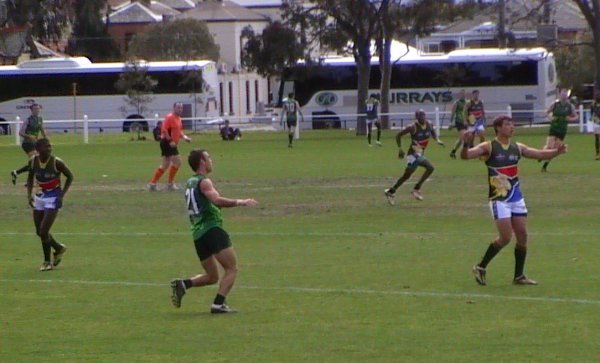
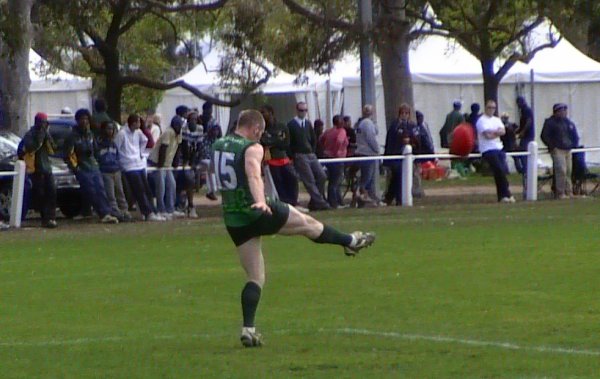
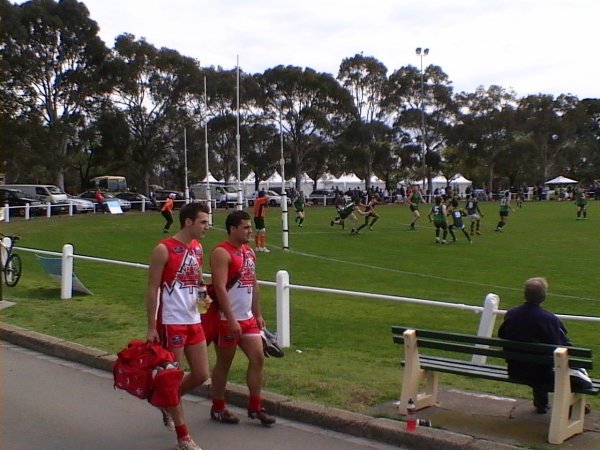
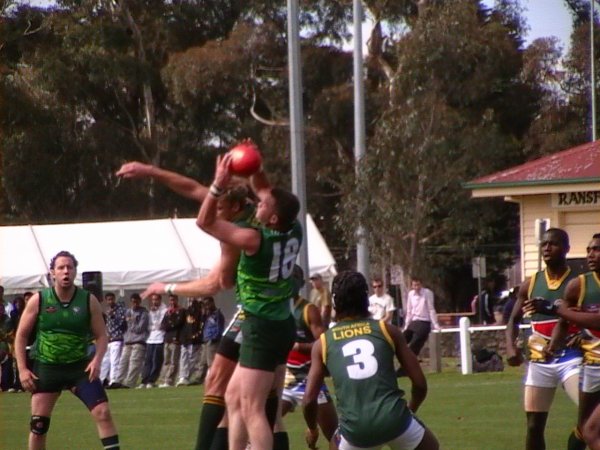
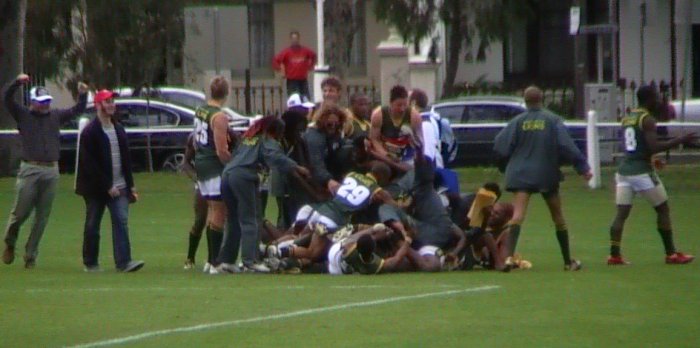
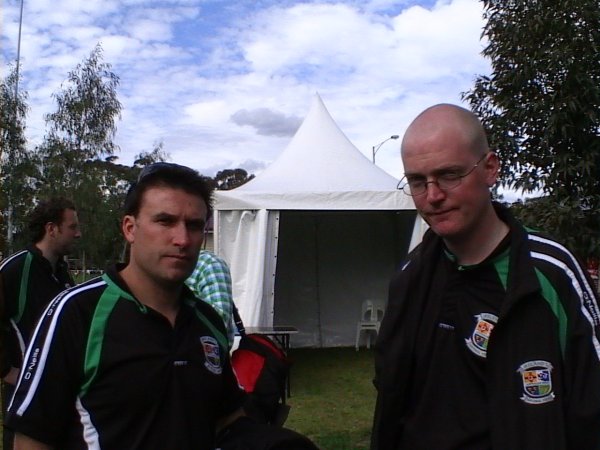
Unimpressed Irish officials Tom Madigan (left) and Ciarán Ó hEadhra (right)


 RSS news
RSS news Twitter
Twitter Facebook
Facebook